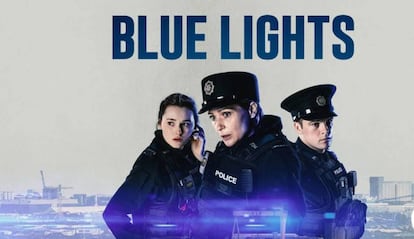‘Blue Lights’, not your average police series
The story of three rookie police officers in a Belfast police station is the definition of excellent television

Blue Lights is an excellent example that the quality of a television series does not depend on expensive special effects or the power of its production. It basically depends on the talent of its scriptwriters, how seriously the production team take the project, and stars who are far from temperamental. The six episodes of the first season are the product of outstanding work by its creators and scriptwriters, Declan Lawn and Adam Patterson, supported by excellent performances by Sian Brooke, Katherine Devlin, Nathan Braniff, and Richard Dormer.
The simple plot is centered around the daily work of police officers at a police station in Belfast, the capital of Northern Ireland, with special emphasis on three rookie officers and their ability to react to the city’s problems. Blue Lights is a series made in 2023, a fact that should be taken into account when watching the series. Many years have passed since the last bloody attack by the Provisional IRA, the political struggle between Catholics and unionists is now in the past, or at least the peace is holding. The problems now are more prosaic and, without a doubt, universal: local mafias and drug trafficking, criminals and police. And it is those problems that veteran and rookie police officers have to face.
The premise is nothing new, but it has one virtue: its narrative style is uncomplicated and has no need to resort to heroic gestures. It comes from the conviction that the institution of the police can be rightly criticized while still providing an essential public service. And fair criticism, it must be remembered, is not the pronouncements of demagogues of the right and the extreme right who are so inclined to point out the speck in another’s eye without removing the log from their own.
Sign up for our weekly newsletter to get more English-language news coverage from EL PAÍS USA Edition
Tu suscripción se está usando en otro dispositivo
¿Quieres añadir otro usuario a tu suscripción?
Si continúas leyendo en este dispositivo, no se podrá leer en el otro.
FlechaTu suscripción se está usando en otro dispositivo y solo puedes acceder a EL PAÍS desde un dispositivo a la vez.
Si quieres compartir tu cuenta, cambia tu suscripción a la modalidad Premium, así podrás añadir otro usuario. Cada uno accederá con su propia cuenta de email, lo que os permitirá personalizar vuestra experiencia en EL PAÍS.
¿Tienes una suscripción de empresa? Accede aquí para contratar más cuentas.
En el caso de no saber quién está usando tu cuenta, te recomendamos cambiar tu contraseña aquí.
Si decides continuar compartiendo tu cuenta, este mensaje se mostrará en tu dispositivo y en el de la otra persona que está usando tu cuenta de forma indefinida, afectando a tu experiencia de lectura. Puedes consultar aquí los términos y condiciones de la suscripción digital.









































